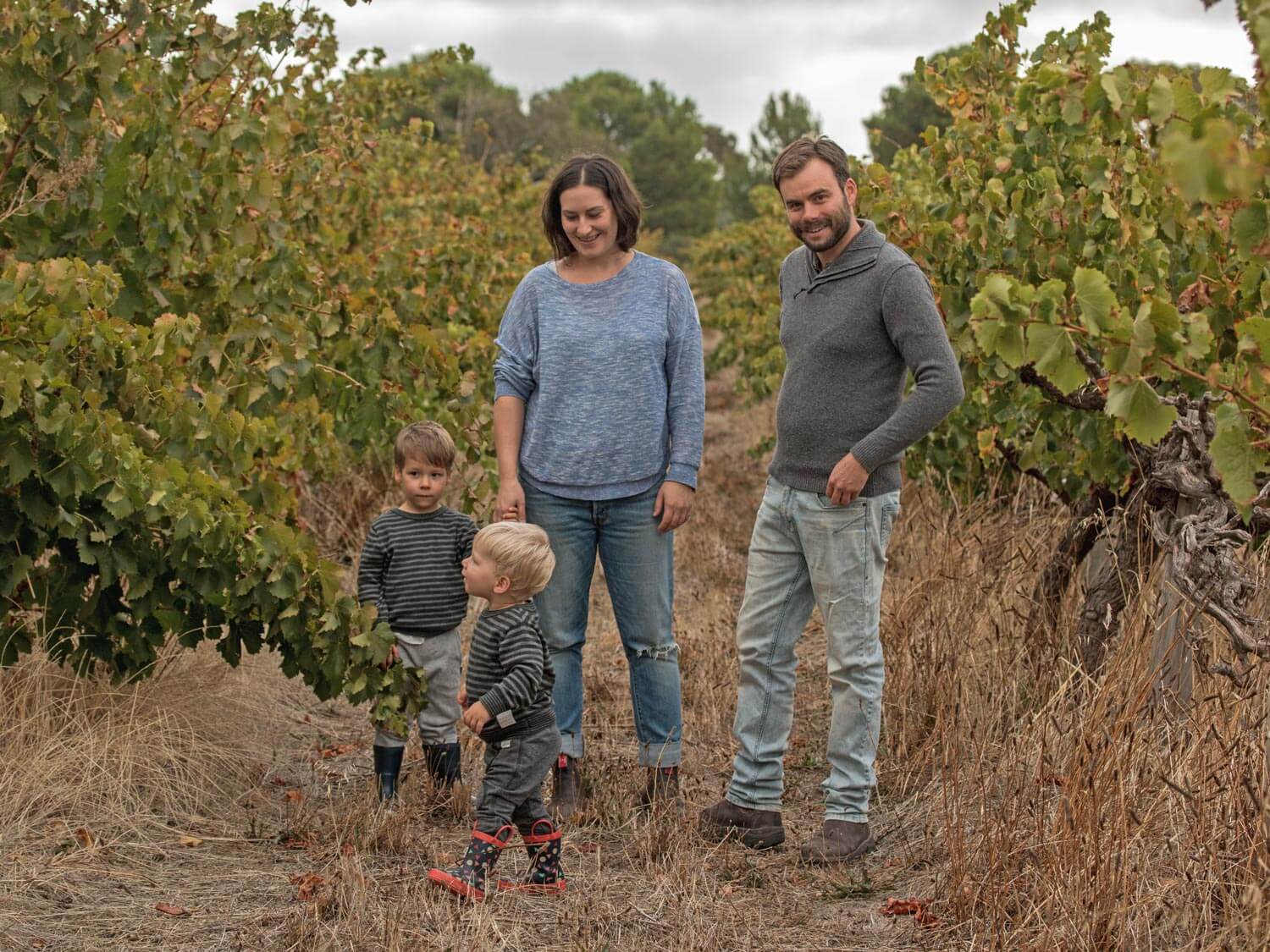James and Kimberly Cooter are both continuing their family traditions of winemaking under their Cooter & Cooter label, as well as for Kimberley’s family winery, The Hedonist. Both labels are built on McLaren Vale classic varieties, with grenache a particular favourite for the pair, while emerging varieties like fiano, tempranillo and sangiovese also appear on the roster. The wines for both labels lean to the midweight, with organic and biodynamic viticulture, earlier picking and a preference for large-format oak creating food-friendly wines to suit the Mediterranean climate.
James and Kimberly Cooter are both second generation winemakers. James’s father is Colin Cooter (Lengs & Cooter), while Kimberley’s is Walter Clappis, who made his name over his 20-year ownership of McLaren Vale stalwart Ingoldby. In that time, Clappis stacked the trophy cabinet with all manner of awards and medals before selling and settling in the Willunga foothills to establish Hedonist Wines. James and Kimberly now take the lead with managing the certified biodynamic property along with making the Hedonist wines.
James and Kimberly also have their own vineyard in nearby Whites Valley. “We had our first vintage under our Cooter & Cooter label in 2013, after purchasing the vineyard in 2012,” says Kimberly. “Our last 16–17 years working at Hedonist has covered all areas of the business, from the vineyard and cellar to marketing and sales, overseeing organic/biodynamic transition, before ultimately taking the winemaking reins several years ago.”
The pair first met working in a wine store in Adelaide, with occasional vintage work leading them both to enrol to study wine science at Charles Sturt University in Wagga Wagga in 2006. “Our journeys have been intertwined ever since,” says Kimberley, noting that they have both completed 19 vintages both in McLaren Vale and Sonoma, California.
“We were already winemakers at Hedonist, but in terms of starting our own brand, it was our vineyard that came first,” she says. “It was more a lifestyle choice – to live on the land and grow grapes. It’s how we wanted to raise our family; we knew it’s what we wanted before we even had kids. Having our own brand just happened through having the vines; it’s instinctive to want to see what you can do with them.”
At the home vineyard, minimising environmental impacts and inputs is an overarching goal. “Specifically, we’re certified under the Sustainable Winegrowing Australia (SWA), as well as being recently certified organic, while also practicing biodynamic farming,” Kimberley says. “Building up the soil humus, increasing beneficial insects and microbial diversity have been our main focus in rejuvenating the vineyard.
“We’re mindful of every tractor pass, minimising cultivation, and utilising perennial multi-species cover crops to keep the soil covered. We’re not oblivious to the fact that we’re farming a monocrop, which is why we’re working to build resilience in the soil with a diverse range of plant species above ground to cultivate a diverse microbial ecosystem below the ground.”
Kimberly says that the vines are in a measurably happier place, requiring less irrigation, while providing more consistent yields and superior fruit quality. “Despite having access to the grapes for ten years, we only decided to utilise the grenache fruit in our own label in 2017,” she says. “This, to us, is vindication of the enhanced quality of fruit over the course of behind-the-scenes work. After many years of blood, sweat and tears, the rewards have been noticeably worth the effort. Our goal is to keep developing and progressing. The way most of us live and farm right now isn’t sustainable at all. We know we have to regenerate and improve, rather than maintain.”
Like many McLaren Vale growers, the pair have been adjusting the plantings to better match the changing climate, which saw merlot removed, with fiano (the first vintage release will be 2023) and grenache taking its place to both match the growing conditions and the style of wines they favour – wine “with a bit of texture and substance” and that are suited to the climate and lifestyle of McLaren Vale, as well as being food friendly. “I hate saying this, but I don’t think we’re breaking the mould,” says Kimberley. “There are so many people in our region and beyond making more and more progressive and approachable wines. We’re grateful to stand alongside them.”
The pair’s love for grenache has seen them create a new line for Hedonist, the ‘Ecology’ Grenache, which they have autonomy over. “We sourced the fruit [from Yangarra and another certified biodynamic site], made the picking call, fermentation, oak, élevage, every decision from the vineyard through to label design and bottling,” says Kimberley. “Our intent here was to create a refined, yet seriously drinkable grenache. Mostly inspired by our love of savoury, midweight reds with a bit of texture. We sought fruit from the relatively cooler depths of McLaren Vale – Kangarilla to bring it to fruition. It’s the old cliché of making wines you love to drink.”
Kimberly says that they favour larger barrels to make their wines, and particularly for grenache, employing 4,500-litre foudres. “They support the delicate nature of grenache without the heavy impact of oak, while preserving the purity. Our intention is to create refined wines with drinkability. We love to drink savoury, midweight reds with a bit of texture, so we strive to make wines that embody this.”
Naturally, the pair see their long term future in the region, but their plan over the next decade is one that is evolving. “We’ll still be in McLaren Vale, living the dream, making wine by the sea,” says Kimberly. “While we haven’t exactly got a concrete plan, we’ll look at removing and replanting to some more appropriate varieties, which will be reflected in our wine offering. I don’t foresee huge expansion, but perhaps a little shift is on the horizon. There’s always a subtle evolution, sometimes without even realising until you’re standing on the other side reflecting.”



